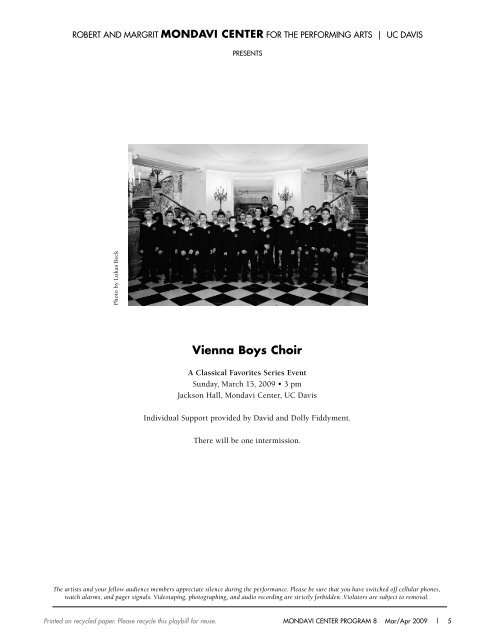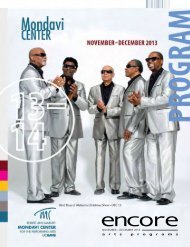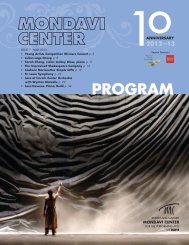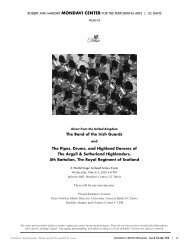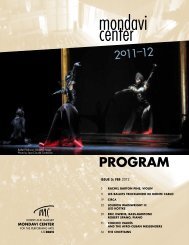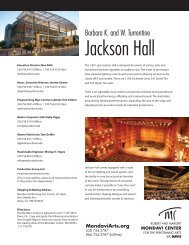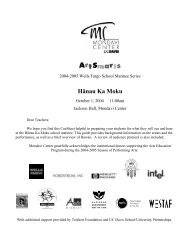Vienna Boys Choir - Mondavi Center
Vienna Boys Choir - Mondavi Center
Vienna Boys Choir - Mondavi Center
You also want an ePaper? Increase the reach of your titles
YUMPU automatically turns print PDFs into web optimized ePapers that Google loves.
Robert and Margrit <strong>Mondavi</strong> <strong>Center</strong> for the Performing Arts | UC Davis<br />
Presents<br />
Photo by Lukas Beck<br />
<strong>Vienna</strong> <strong>Boys</strong> <strong>Choir</strong><br />
A Classical Favorites Series Event<br />
Sunday, March 15, 2009 • 3 pm<br />
Jackson Hall, <strong>Mondavi</strong> <strong>Center</strong>, UC Davis<br />
Individual Support provided by David and Dolly Fiddyment.<br />
There will be one intermission.<br />
The artists and your fellow audience members appreciate silence during the performance. Please be sure that you have switched off cellular phones,<br />
watch alarms, and pager signals. Videotaping, photographing, and audio recording are strictly forbidden. Violators are subject to removal.<br />
Printed on recycled paper. Please recycle this playbill for reuse. MONDAVI CENTER PROGRAM 8 Mar/Apr 2009 | 5
vienna boys choir<br />
VIENNA BOYS CHOIR<br />
Wiener Sängerknaben<br />
Andy Icochea Icochea,<br />
Conductor<br />
Alleluia. Video caelos apertos (I See the Open Heavens)<br />
O Fortuna (Fortuna Imperatrix Mundi) from: Carmina burana<br />
Tota pulchra es Maria (You are Wholly Beautiful, Mary). Motet<br />
Lobe den Herren, meine Seele (Praise the Lord, My Soul) from:<br />
Symphony No. 2 in B-flat major, Op. 52 (1840)<br />
Pueri concinite (<strong>Boys</strong>, Begin). Motet for four-part boys’ chorus<br />
Ave verum corpus (Hail, true body), Op. 65, No. 1 (1894)<br />
Motet for two equal voices and organ<br />
Tenebrae factae sunt (Darkness Fell). Motet for four part a cappella choir<br />
Angyalok es pasztorok (The Angels and the Shepherds)<br />
Die Nacht, Op.17, No. 4, D. 983C (1822)<br />
Nachthelle (Night Brightness) D. 892 (1826)<br />
Et lux in tenebris lucet (And a Light Shines in Darkness)<br />
Salut printemps (Hello, Spring), for women’s voices and orchestra (1882)<br />
Psalm 61 (2006)<br />
Gregorian chant<br />
Carl Orff<br />
Maurice Duruflé<br />
Felix Mendelssohn-Bartholdy<br />
Jacobus Gallus<br />
Gabriel Fauré<br />
Tomás Luis de Victoria<br />
Zoltan Kodály<br />
Franz Schubert<br />
Text: Friedrich Adolf Krummacher<br />
Franz Schubert<br />
Text: Johann Gabriel Seidl<br />
Andy Icochea Icochea<br />
Claude Debussy<br />
Text: Anatole de Ségur<br />
Andy Icochea Icochea<br />
POPULAR SONGS<br />
Chiqitita (1979)<br />
I’ve Grown Accustomed to Her Face, from the musical My Fair Lady<br />
Seasons of Love, from the musica Rent (1994)<br />
Björn Ulvaeus and Benny Anderson<br />
Music: Frederick Loewe<br />
Text: Alan Jay Lerner<br />
Jonathan Larson<br />
INTERMISSION<br />
6 | mondaviarts.org
Austria<br />
Tritsch Tratsch (Chit Chat), fast polka, Op. 214<br />
AROUND THE WORLD IN FIVE SONGS<br />
Johann Strauss, Jr.<br />
Text: Rosl Hujer<br />
Arr. Uwe Theimer<br />
vienna boys choir<br />
Italy<br />
La passeggiata - Finché sereno è il cielo (The Excursion)<br />
from Péchés de vieillesse, Volume 1: Album Italiano, No. 12<br />
Bulgaria<br />
Dilmano Dilbero, Folk song<br />
Argentina<br />
La muerte del Angel (The Death of the Angel)<br />
Korea<br />
Arirang. Korean love song, from the province of Kyonggi Do<br />
Gioacchino Rossini<br />
Arr. Andy Icochea Icochea<br />
Arr. Krassimir Kyurkchiyaski<br />
Astor Piazolla<br />
Arr. Andy Icochea Icochea<br />
Arr. Gerald Wirth<br />
SONGS FROM THE CHOIR’S FILM<br />
SILK ROAD – SONGS ALONG THE ROAD AND TIME<br />
Uzbekistan<br />
Sus Xâtin. Ancient Uzbek prayer for rain.<br />
Finland<br />
Ievan Polkka (Eva’s Polka) (1937)<br />
Four Austrian Folksongs<br />
Wann Du durchgehst durchs Tal (When You Walk Through the Valley)<br />
Carinthian love song<br />
Arr. Gerald Wirth<br />
Text: Eino Kettunen<br />
Arr. Andy Icochea Icochea<br />
Arr. Gerald Wirth<br />
Es gibt schoene Wasserl (There are Beautiful Waters)<br />
Dancing song from the Mühlviertel, Upper Austria<br />
Und wanns amal schen aper wird (And When It Starts to Thaw).<br />
Alpine song with yodeling from the town of Eisenerz, Styria<br />
Waldhansl (John of the Forest)<br />
Clapping and stamping dance from the Ausseerland, Upper Austria<br />
Spiritual<br />
He Never Failed Me Yet<br />
Eljen a Magyar (Hail to Hungary). Fast polka, Op. 332 (1869)<br />
Kaiserwalzer (Emperor’s Waltz). Waltz, Op. 437 (1888)<br />
Robert Ray<br />
Arr. Andy Icochea Icochea<br />
Johann Strauss, Jr.<br />
Johann Strauss, Jr.<br />
Text: Viktor Gomboz<br />
Arr. Gerald Wirth<br />
Program subject to change<br />
Printed on recycled paper. Please recycle this playbill for reuse. MONDAVI CENTER PROGRAM 8 Mar/Apr 2009 | 7
<strong>Vienna</strong> <strong>Choir</strong> <strong>Boys</strong><br />
Andy Icochea Icochea, choirmaster<br />
Andy Icochea Icochea became choirmaster of the <strong>Vienna</strong> <strong>Boys</strong><br />
<strong>Choir</strong> in 2005. He has since led the choir on tours of China,<br />
Cyprus, Germany, Guatemala, Ireland, Japan, Mexico, Panama,<br />
Switzerland, Taiwan, and the U.S. Among the highlights were concerts<br />
in <strong>Vienna</strong>’s Musikverein, Dublin’s National Concert Hall, the<br />
Palacio de Bellas Artes in México City, Symphony Hall in Chicago,<br />
New York’s Carnegie Hall, and the Kimmel <strong>Center</strong> in Philadelphia.<br />
In addition to the international tours, Icochea Icochea prepares<br />
the boys for the performances of Mass at the Imperial Chapel, for<br />
performances at the <strong>Vienna</strong> State Opera and Volksoper, as well as<br />
performances of symphonic works conducted by Adam Fischer,<br />
Riccardo Muti, Franz Welser-Möst, and Simone Young. He regularly<br />
conducts the boys’ choir, the Chorus Viennensis, and the <strong>Vienna</strong><br />
Chamber Orchestra in the choir’s Friday concert series at <strong>Vienna</strong>’s<br />
Musikverein.<br />
As a conductor, he led the world premieres of Carlo Pedini’s<br />
opera Il Miracolo and Marco Pontini’s opera Togliti il Mantello in<br />
Citta della Pieve, Italy. He is Music Director and founder of the<br />
Ensemble <strong>Vienna</strong> Nova which he has led in successful performances<br />
of such operas as The Abduction from the Serail, The Magic Flute,<br />
and The Elixir of Love at Theater L.E.O. in <strong>Vienna</strong>, where he also<br />
serves as Music Director. In 2005, Icochea conducted the Sinfonica<br />
Nacional del Peru in a concert that included the Peruvian premiere<br />
of Roberto Sierra’s Concerto Barroco for guitar and orchestra<br />
and Federico Tarazona’s Concerto Alpamayo 2 for hatun charango<br />
and orchestra. His own compositions have been published by<br />
Ediciones Julia.<br />
Icochea Icochea was born in Lima, Peru. He began piano and<br />
music theory studies at the age of seven at Instituto Musical Bach<br />
and later enrolled as a piano student at the Conservatorio Nacional<br />
de Musica del Peru. At the same time, he read arts and sciences at<br />
the Catholic University of Peru. He holds a degree in piano performance,<br />
magna cum laude, from Westminster <strong>Choir</strong> College in<br />
Princeton, New Jersey. He also studied orchestral conducting at the<br />
Wiener Konservatorium in <strong>Vienna</strong>.<br />
As a member of the Westminster Symphonic <strong>Choir</strong>, he sang with<br />
orchestras such as the New York Philharmonic, the Philadelphia<br />
Orchestra, the Konzertgebouw Orchestra, and the New Jersey<br />
Symphony, under Riccardo Muti, Wolfgang Sawallisch, Riccardo<br />
Chailly, Sir Colin Davis, and Zdenek Macal among others. He was<br />
guest conductor for the Concerto Competition Concert and the<br />
Composers Concert with the Westminster Community Orchestra.<br />
Upon arrival in <strong>Vienna</strong>, he joined the Arnold Schoenberg <strong>Choir</strong>.<br />
With this ensemble, he sang under Erwin Ortner, Nikolaus<br />
Harnoncourt, Sir Simon Rattle, Adam Fischer and others,<br />
with such orchestras as the Wiener Philharmoniker, Berliner<br />
Philharmoniker, and Concentus Musicus Wien.<br />
Gerald Wirth, artistic director<br />
Gerald Wirth received his first musical training as a member of the<br />
choir and at the Bruckner Konservatorium in Linz, Austria, where<br />
he studied voice, oboe, and piano. He has conducted choirs and<br />
orchestras in many countries, and played and sung in a number of<br />
ensembles. He has written two children’s operas, a Mass, motets,<br />
and countless arrangements for choirs. Many of his works have<br />
been performed internationally. In 2001, Wirth became the artistic<br />
director of the <strong>Vienna</strong> <strong>Boys</strong> <strong>Choir</strong>. While he is keenly aware of<br />
the choir’s rich tradition, Wirth also explores new ways to create<br />
and make music. He has instigated a number of projects involving<br />
world music, a cappella pop, and film music.<br />
<strong>Vienna</strong> <strong>Boys</strong> <strong>Choir</strong><br />
<strong>Boys</strong> have been singing at the court of the Holy Roman Emperor<br />
since the early 15th century. In 1498, more than half a millennium<br />
ago, Emperor Maximilian I moved his court and his court<br />
musicians to <strong>Vienna</strong>. He gave instructions that there were to be six<br />
singing boys among his musicians. Historians have settled on 1498<br />
as the foundation date of the <strong>Vienna</strong> Hofmusikkapelle and—in<br />
consequence—the <strong>Vienna</strong> <strong>Boys</strong> <strong>Choir</strong>. Until 1918, the choir sang<br />
exclusively for the imperial court, at mass, at private concerts and<br />
functions, and on state occasions.<br />
Musicians like Heinrich Isaac, Paul Hofhaimer, Heinrich Ignaz,<br />
Franz Biber, Johann Joseph Fux, Wolfgang Amadeus Mozart,<br />
Antonio Caldara, Antonio Salieri, and Anton Bruckner worked<br />
with the choir. Composers Jacobus Gallus and Franz Schubert and<br />
conductors Hans Richter, Felix Mottl, and Clemens Krauss were<br />
themselves choristers. Brothers Joseph and Michael Haydn were<br />
members of the choir of St. Stephen’s Cathedral and frequently<br />
sang with the imperial boys’ choir.<br />
In 1918, after the breakdown of the Habsburg Empire, the Austrian<br />
government took over the court opera, its orchestra, and the adult<br />
singers, but not the boys’ choir. The <strong>Vienna</strong> <strong>Boys</strong> <strong>Choir</strong> owes its<br />
survival to the initiative of Josef Schnitt, who became Dean of<br />
the Imperial Chapel in 1921. Schnitt established the boys’ choir<br />
as a private institution: the former court choir boys became the<br />
Wiener Sängerknaben (<strong>Vienna</strong> <strong>Boys</strong> <strong>Choir</strong>). The imperial uniform<br />
was replaced by the sailor suit, then the height of boys’ fashion.<br />
Funding was not enough to pay for the boys’ upkeep, and in 1926,<br />
the choir started to give concerts outside of the chapel, performing<br />
motets, secular works, and—at the boys’ request—children’s operas.<br />
The impact was amazing. Within a year, the choir performed in<br />
Berlin (where Erich Kleiber conducted them), Prague, and Zurich.<br />
Further tours followed: Athens and Riga (1928), then Spain,<br />
France, Denmark, Norway, and Sweden (1929), the United States<br />
(1932), Australia (1934), and South America (1936).<br />
Today there are around 100 choristers between the ages of 10 and<br />
14, divided into four touring choirs. The four choirs give around<br />
300 concerts and performances each year in front of almost half a<br />
million people. Each group spends nine to 11 weeks of the school<br />
year on tour. They visit virtually all European countries, and they<br />
are frequent guests in Asia, Australia, and the Americas. Together<br />
with members of the <strong>Vienna</strong> Philharmonic Orchestra and the<br />
<strong>Vienna</strong> State Opera Chorus, the <strong>Vienna</strong> <strong>Boys</strong> <strong>Choir</strong> maintains the<br />
tradition of the imperial musicians: as Hofmusikkapelle they provide<br />
the music for the Sunday Mass in <strong>Vienna</strong>’s Imperial Chapel, as<br />
they have done since 1498. Dr. Franz Schlosser became the choir’s<br />
director in 2008.<br />
Repertoire<br />
The choir’s repertoire includes everything from medieval to contemporary<br />
and experimental music. Motets and lieder for boys’<br />
choir form the core of the touring repertoire, along with the choir’s<br />
own arrangements of quintessentially Viennese music: waltzes<br />
and polkas by Strauss, Lanner, and Lehar. Both the choir and<br />
the Hofmusikkapelle have a long tradition of commissioning new<br />
works. Austrian composers Heinz Kratochwil, Ernst Krenek, and<br />
Balduin Sulzer have written works for the choir.<br />
8 | mondaviarts.org
The <strong>Vienna</strong> <strong>Boys</strong> <strong>Choir</strong> performs major choral and symphonic<br />
works, sometimes as part of the Hofmusikkapelle, sometimes<br />
with other orchestras and men’s choirs. They are regularly asked<br />
to supply soloists for large choral and orchestral works, such as<br />
Bernstein’s Chichester Psalms and Mahler’s Das klagende Lied. In<br />
recent years, they have performed with the <strong>Vienna</strong> Philharmonic<br />
Orchestra, the <strong>Vienna</strong> Symphony Orchestra, the Staatskapelle<br />
Berlin, the Oslo Philharmonic, and the Pittsburgh Symphony<br />
Orchestra. Recent guest conductors include Pierre Boulez,<br />
Nikolaus Harnoncourt, Mariss Jansons, Zubin Mehta, Riccardo<br />
Muti (honorary member of the Hofmusikkapelle), Kent Nagano,<br />
Seiji Ozawa, and Simone Young. Choristers also take part in opera<br />
performances at the <strong>Vienna</strong> State Opera, the <strong>Vienna</strong> Volksoper, and<br />
the Salzburg Festival.<br />
Children’s Operas<br />
Children’s operas are an important part of the repertoire; the boys<br />
all love to act. The choir started performing operas in the 1920s,<br />
beginning with classics such as Mozart’s Bastien und Bastienne,<br />
Weber’s Abu Hassan, and Haydn’s Der Apotheker. Benjamin<br />
Britten wrote The Golden Vanity for the choir and conducted its<br />
premiere at the Aldeburgh Festival in 1967 in the presence of<br />
Queen Elizabeth II. In the last decade, the choir has successfully<br />
produced a number of new operas. Gerald Wirth’s The Journey of<br />
the Little Prince and The Tablet of Destinies, an opera based on the<br />
Babylonian myth of Anzu, and Raoul Gehringer’s Moby-Dick, based<br />
on the novel by Herman Melville, were all performed at <strong>Vienna</strong>’s<br />
Musikverein.<br />
World Music and Cross-over Projects<br />
Since the 1920s, the choir has collected music from around the<br />
world. One of the choir’s goals is to introduce the boys to as many<br />
different styles of music as possible. The choir has commissioned<br />
a number of world music projects. As Gerald Wirth explains, “We<br />
do not claim to play ‘authentic’ world music; we create something<br />
from the original sources that is our own. We want to be faithful<br />
to the source in the sense that we treat it with respect.” Silk Road<br />
is the choir’s third world music project. The colorful journey along<br />
the old trade route was staged by Rebecca Scheiner, a stage director<br />
at the <strong>Vienna</strong> State Opera, and features songs from Uzbekistan<br />
and China, a qawwali from Pakistan, a ghazal from Iran, and field<br />
hollers from Tajikistan, all sung in the original languages. Pirates<br />
tells the story of 18th-century pirates, using music from Yemen,<br />
Madagascar, the Caribbean, and Latin America. The choristers,<br />
who also sing popular music, have contributed to a number of<br />
soundtracks for major motion pictures in the U.S., Japan, and<br />
Europe.<br />
The <strong>Choir</strong> School<br />
The choir maintains its own school. Almost 250 children study<br />
and rehearse in the Augartenpalais, a baroque palace and former<br />
imperial hunting lodge in <strong>Vienna</strong>. Beginning with kindergarten,<br />
boys and girls are provided with a complete musical and general<br />
education through the elementary grades. At age 10, the<br />
most talented boys are selected to join the choir and enter the<br />
choir’s grammar school. All boys are assigned to one of the touring<br />
choirs. Academic lessons are taught in small groups. The<br />
school has a band, and offers extracurricular activities ranging<br />
from sports (baseball, basketball, fencing, judo, soccer, skating,<br />
swimming, volleyball) to attending pop concerts, operas, plays,<br />
musicals, and movies. The choristers are also encouraged to create<br />
their own projects; a number of them write, act, and direct<br />
short sketches or films. All choir boys live in the choir’s own wellappointed<br />
boarding school; two to three boys share a room.<br />
Many of the school’s alumni become professional musicians, conductors,<br />
singers, or instrumentalists, in <strong>Vienna</strong> and abroad. Almost<br />
all continue to sing. There are two male voice ensembles made<br />
up entirely of former choristers: the Chorus Viennensis and the<br />
Imperial Chapel’s Schola Cantorum.<br />
Hotel Residenz Palais Coburg is the <strong>Vienna</strong> <strong>Boys</strong> <strong>Choir</strong> general<br />
sponsor.<br />
Exclusive Tour Management:<br />
Opus 3 Artists<br />
470 Park Avenue South, 9th Floor North<br />
New York, NY 10016<br />
<strong>Vienna</strong> <strong>Choir</strong> <strong>Boys</strong><br />
Silk Road – Songs Along the Road and Time<br />
The choir’s opera Silk Road inspired acclaimed director Curt<br />
Faudon to make a film about the globetrotting choristers. For<br />
more than a year, Faudon followed the boys’ lives in <strong>Vienna</strong> and<br />
on the road, filming the boys at work and at play, on and off stage,<br />
meeting and working with artists from Central Asia, China, and<br />
India. The resulting 90-minute film is a clever blend of fly-on-the<br />
wall documentary, road movie, costume drama, and music, with<br />
stunning footage from across the world and through time; it is<br />
available on DVD and Blu-Ray disc. The unusual, off-beat soundtrack<br />
features a cross-section through the choir’s repertoire, with<br />
many first recordings. It has the boys singing in Latin, Arabic,<br />
Chinese, Farsi, French, Marathi, Maori, Savo Finnish, Tajik,<br />
Uyghur, Urdu, Uzbek, and German.<br />
Printed on recycled paper. Please recycle this playbill for reuse. MONDAVI CENTER PROGRAM 8 Mar/Apr 2009 | 9


